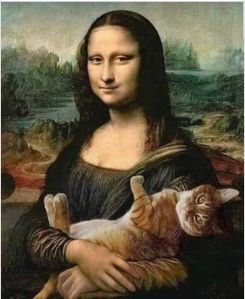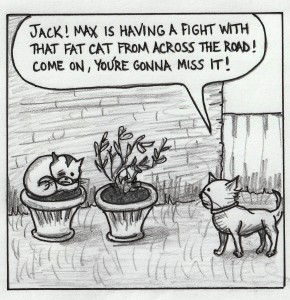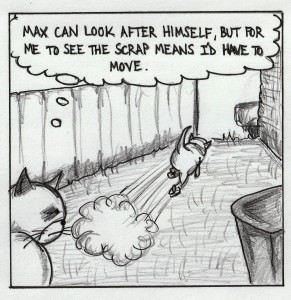 If you’ve nothing to say, say nothing. The image to the left of this paragraph says nothing other than I like it. Even though the last post on here wasn’t bad, it didn’t attract much attention and I have admittedly written about the subject matter several times before; dejá vu and all that. As of December 2017, the pace has also slowed considerably, so I suppose my missives have ceased to be key to the daily routine of many; followers don’t know when to expect them anymore, but then again, neither do I. And, as I’m not an end-of-the-pier comic going through the motions before an audience of comatose pensioners whose dementia means every old gag is a new gag every time they hear it, I am not obliged to repeat myself to make a living. I used a photo of Archie Rice on a recent post, so I can’t recycle it as a visual accompaniment to enhance my point, but you should get where I’m coming from without it.
If you’ve nothing to say, say nothing. The image to the left of this paragraph says nothing other than I like it. Even though the last post on here wasn’t bad, it didn’t attract much attention and I have admittedly written about the subject matter several times before; dejá vu and all that. As of December 2017, the pace has also slowed considerably, so I suppose my missives have ceased to be key to the daily routine of many; followers don’t know when to expect them anymore, but then again, neither do I. And, as I’m not an end-of-the-pier comic going through the motions before an audience of comatose pensioners whose dementia means every old gag is a new gag every time they hear it, I am not obliged to repeat myself to make a living. I used a photo of Archie Rice on a recent post, so I can’t recycle it as a visual accompaniment to enhance my point, but you should get where I’m coming from without it.
Sure, I’ve got my favourite recurring jokes – ‘Have you heard the one about complainants making unproven sexual assault allegations being described as rape victims by the mainstream media?’; ‘A man walks into a polling booth and is faced with a choice between staying in the EU or staying in the EU’; ‘How many Guardian journalists does it take to rewrite British history to vindicate their white guilt complex?’; ‘A mentally-ill Englishman, a disabled Irishman and a Scotsman with cancer all manage to walk unaided into a DWP assessment centre and are deemed fit for work’; and not forgetting the funniest joke ever, ‘Chris Grayling’. It’s the way I tell ‘em.
Back before YouTube blocked, banned and censored anyone expressing an opinion at odds with the imposed consensus, I used to upload little videos of a humorous and occasionally satirical bent on a regular basis, a practice from which all the fun was gradually extracted as navigating the increasing obstacles placed before the individual voice became more trouble than it was worth. I still receive comments on said videos, however, many of which implore more of the same. Even if I hadn’t been demonetised and demoralised by the new order controlling the old forum, they probably did me a backhanded favour by making me an undesirable; it gave me a reason to quit whilst ahead, thus just about avoiding excessive repetition in the process.
As with re-watching the YT videos that have survived the cull, I sometimes return to old posts on here and re-read them in as much of a non-narcissistic manner as I can manage; the passage of time thankfully provides sufficient detachment that negates accusations of masturbation. As with other blogs out there, there are numerous posts grouped under the same subject matter, often an ongoing saga in which updates are necessary if said subject can be mined for multiple articles. Yet, I find there’s a limit to how much can be written about one topic – not all, as my persistent probing of Brexit demonstrates; but when it comes to some, yes, I really don’t feel like I can add anything else to what I feel I’ve said rather well in the past.
As a novelist who has recently returned to the habit after more than a year away from it, I’ve never been drawn to ‘the series’ – that is, a sequence of books featuring recurring characters inhabiting worlds visited in previous books. Writing a novel takes months and a ‘difficult’ one can be a bit of a grind. When I reach the end, I’m done. I want to get as far away from the world I’ve just spent every day of the last half-year inhabiting, and I never want to meet any of the characters again; the thought of creating a Holmes or a Bond or a Potter is anathema to me. When it comes to the next book, I want to create somewhere I’ve never been before and go there with someone I’ve never met before.
I guess it’s a bit like when a band gets home from a long, gruelling tour and vows never to set foot on the road again; virtually all eventually relent because that’s how they make most of their money. It’s different for me, as there aren’t the same financial pressures associated with my ‘art’. I make around 50p from every book of mine that someone buys. An author’s royalties are akin to what one of the be-quiffed thoroughbreds in Larry Parnes’ early 60s stable could hope to earn; and those signed-up to big publishing houses (whose surnames aren’t Rowling or Brown) don’t fare much better, hence their endless sidelines as newspaper columnists or ‘Question Time’ regulars.
Despite what the opening statement of this post says, I do have plenty to say right now – only, it’s not the kind of stuff that should be shared, closer to what ought to be reserved for a diary; if I still kept a diary, it’d probably end up in there. Nobody else would want to read it, trust me. And it’s, like, boring, innit. So, in the meantime, I shall wait for another notable name to die or for the European Elections to take place, if there is indeed British participation; the potential annihilation of the Conservative Party at the polls is too joyous an event not to be inspired by, after all. And that’s it, I suppose – inspiration. I need it to do it. If there ain’t any, a visit to this blog will result in the visitor being greeted by the last post, whichever post that may be. Time for a chuckle while we wait…



© The Editor

 I suspect people had more blind faith where their leaders were concerned before 1973. If Watergate or a comparable scandal (in terms of cultural impact) was to happen now, how would we respond to the revelation that the biggest elected representative in the land was a bit of a crook? Shock! Horror! Yes, certainly in the media’s delivery of the news to the masses; but what of the masses themselves? A shrug of the shoulders and a resigned ‘Well, they’re all bent bastards’, perhaps; indeed, one wonders if Richard Nixon would simply serve out his second term of office today and face down the challenge of impeachment as Bill Clinton did. The general consensus now we are sufficiently distanced from the activities of Tricky Dicky’s inept White House mobsters appears to be that what Nixon got up to behind closed doors was no worse than what many of his predecessors got up to, not to mention his successors.
I suspect people had more blind faith where their leaders were concerned before 1973. If Watergate or a comparable scandal (in terms of cultural impact) was to happen now, how would we respond to the revelation that the biggest elected representative in the land was a bit of a crook? Shock! Horror! Yes, certainly in the media’s delivery of the news to the masses; but what of the masses themselves? A shrug of the shoulders and a resigned ‘Well, they’re all bent bastards’, perhaps; indeed, one wonders if Richard Nixon would simply serve out his second term of office today and face down the challenge of impeachment as Bill Clinton did. The general consensus now we are sufficiently distanced from the activities of Tricky Dicky’s inept White House mobsters appears to be that what Nixon got up to behind closed doors was no worse than what many of his predecessors got up to, not to mention his successors. Aged three, I guess the saddest sentence in the English language for me was ‘It’s time for Andy Pandy to wave goodbye now’; it was infancy’s equivalent of ‘I’ve met someone else’, though at least the end-of-the-world dejection was diluted by the promise of a return visit to Andy’s place the following week: ‘But he’s coming again soon.’ And he did, as did all of the inhabitants of television’s toy-box, despite the fact I had no say over my rationed encounters with them. They were my friends before I had real friends, and I regularly indulge in pre-school reunions now that I’m no longer dependent on broadcasters to determine when I can see them again.
Aged three, I guess the saddest sentence in the English language for me was ‘It’s time for Andy Pandy to wave goodbye now’; it was infancy’s equivalent of ‘I’ve met someone else’, though at least the end-of-the-world dejection was diluted by the promise of a return visit to Andy’s place the following week: ‘But he’s coming again soon.’ And he did, as did all of the inhabitants of television’s toy-box, despite the fact I had no say over my rationed encounters with them. They were my friends before I had real friends, and I regularly indulge in pre-school reunions now that I’m no longer dependent on broadcasters to determine when I can see them again. ‘We’re becoming a very petty nation!’ So declared the officious Inspector Pratt on a 1972 episode of ‘Z-Cars’; he was incensed by the attitude of two long-haired scruffs in custody after they refused to co-operate and sign statements on the subject of their arrest. They’d been nicked driving a digger away from a building site, having missed the last train home; and they’d missed said train due to being held up during a pub raid conducted by Inspector Pratt barely a minute after the towels had been draped over the pumps. It was a quiet evening on the night-shift (not so much knife-crime in early 70s Newtown) and Inspector Pratt decided to undertake an operation that ironically echoed his own sentiments in all its intransigent pettiness. Clever writing in a TV series from almost half-a-century ago nevertheless makes a still-relevant point about hypocrisy and double standards, how one side can see pettiness in the other whilst simultaneously being blind to its own.
‘We’re becoming a very petty nation!’ So declared the officious Inspector Pratt on a 1972 episode of ‘Z-Cars’; he was incensed by the attitude of two long-haired scruffs in custody after they refused to co-operate and sign statements on the subject of their arrest. They’d been nicked driving a digger away from a building site, having missed the last train home; and they’d missed said train due to being held up during a pub raid conducted by Inspector Pratt barely a minute after the towels had been draped over the pumps. It was a quiet evening on the night-shift (not so much knife-crime in early 70s Newtown) and Inspector Pratt decided to undertake an operation that ironically echoed his own sentiments in all its intransigent pettiness. Clever writing in a TV series from almost half-a-century ago nevertheless makes a still-relevant point about hypocrisy and double standards, how one side can see pettiness in the other whilst simultaneously being blind to its own. No other artistic medium can evoke past people and places with the speed and precision of music. Old songs are often intensely personal time capsules that, once unlocked years or even decades after they ceased to provide life with its soundtrack, can resurface as defining documents of who we were, where we were, and who were with when our ears last heard them. A few bars out-of-the-blue can put you back where you were in an instant, as though the moment is so deeply engrained in the grooves of the record that the moment is as intrinsic to the recording as the instrumentation; it can be impossible to separate the song from the moment.
No other artistic medium can evoke past people and places with the speed and precision of music. Old songs are often intensely personal time capsules that, once unlocked years or even decades after they ceased to provide life with its soundtrack, can resurface as defining documents of who we were, where we were, and who were with when our ears last heard them. A few bars out-of-the-blue can put you back where you were in an instant, as though the moment is so deeply engrained in the grooves of the record that the moment is as intrinsic to the recording as the instrumentation; it can be impossible to separate the song from the moment.